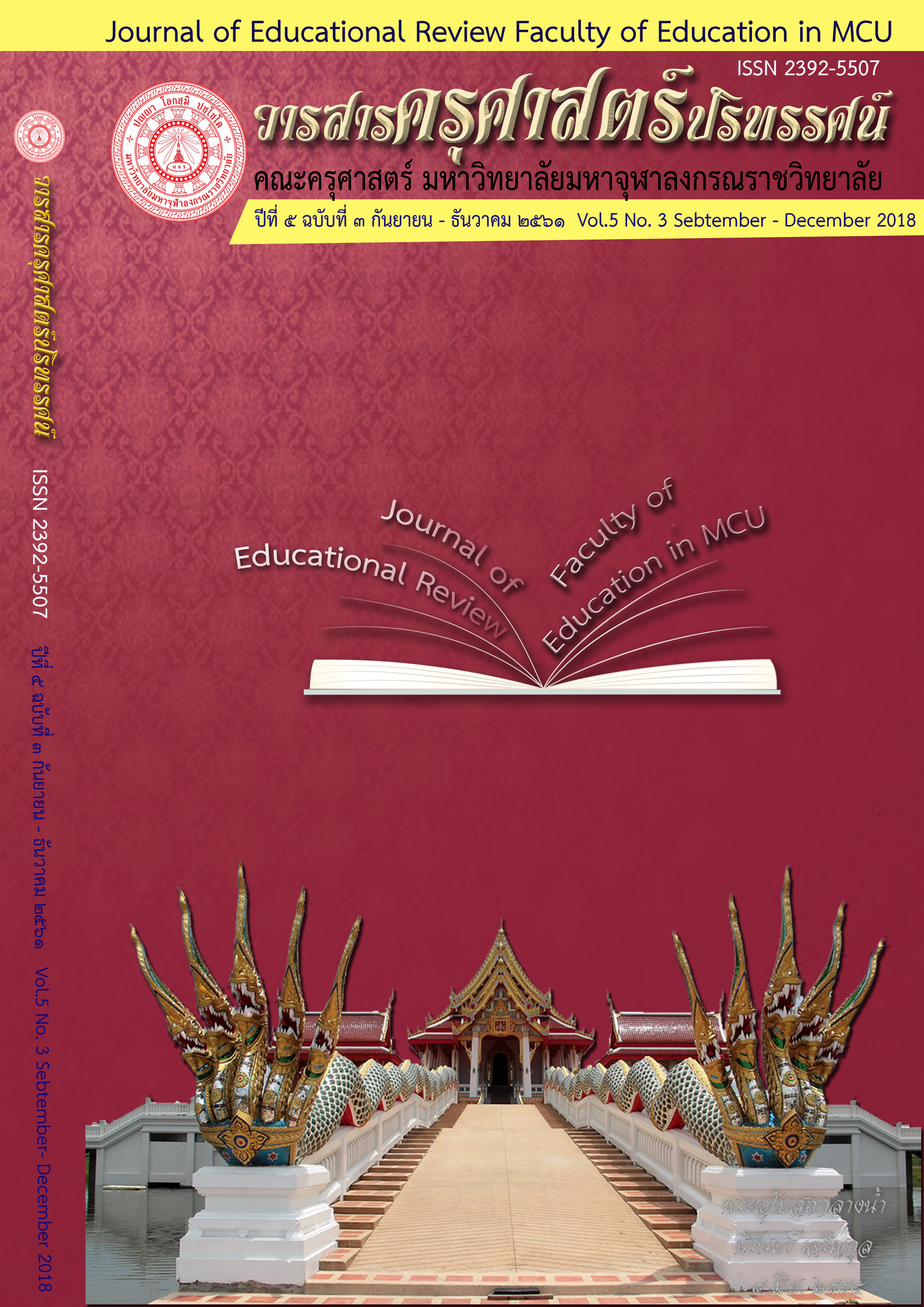Enhancing the Morality and Ethics of Juvenil by Using Cultural Capital
Main Article Content
Abstract
The purpose of this research was to 1) analyze the category condition of morality and virtue learning of the youth by the supporting of the local culture funds, 2) study the process of morality and virtue learning of the youth supported by the local culture funds, and 3) construct the learning process of the youth from the local culture funds as well as the reinforcements of morality and virtue.
This study was an applied research focused on local areas and documents. The research methodology was conducted by paraphrasing and integrating the lessons. And the data gained by reviewing from the fixed education areas were also conducted. The most important data from 18 subjects chosen only the experts were kept to utilize. The instruments used for collecting data were in-depth interviews with their structure. 12 scholars used by the approaches of person to person interviews, especially who were expertized were collected.
The results of the research revealed that
1. The analysis category condition of morality and virtue learning of the youth by supporting of the local culture funds found that the community of Ban Choengpha Mu 11 has their important traditions, i.e. they have tradition concerning ‘Kin khawsalak’ or eating rice offerings, ‘Kinkhawcilam’ or eating sticky rice cooked in a bamboo tube, husked rice alms and including dried food alms offerings, which are said to be the tradition of ‘Lanna’ or of the northern Thai. Apart from these, there are still traditions of ‘Loy Krathong’ or known as ‘Loy Krathong Festival’including ‘RotnamDamhua’ or pouring water to elder people on ‘Songkran Day’ (an old Thai New Year Day). All of this, there are also knowledge and folk wisdom within the villages. People and the youth have known their own rights and duties. Everyone has different right and duty in according to one’s roles for each individual. That is, the young people have duties to help themselves and their parents with a variety of chores. They also repay their beneficence to their parents by intending to study. They have responsibilities and make decisions by means of what is right or wrong. Besides, they can consider things by using their reasons as well as their intellect and have self-confidence. It could be said that these things occurred by their parents’ raising and included the teachings of their teachers. The youth have known what is right or wrong and have good personalities. All of these things are factors to make the youth to be good citizens for their society. In addition, the youth themselves have self-discipline and self-confidence to accept real situations.
2. To study the process of morality and virtue of the youth by the supporting of the local culture funds found that the activities were accepted by the co-operation of the family institution. The opportunities sought for the youth’s experience were opened by methods of learning by doing themselves. The youth were motivated by using thinking and understanding processes. They were also faithful to find knowledge and learning for life. This can be done by having morality and virtue and by using arts and culture to drive the youth to take part in the activities of the community. In order to make the youth learn, opportunities had to be opened to the youth to interact with other society as well as other information sources. The construction of learning activities, therefore, should be fun if the exchange of ideas, thought weaving to conquer the problems are things that every adult in society tried to find out the ways, approaches suited for their children so that they felt like participating in activities.
3. As for constructing the learning process for the youth from the local culture funds as well as the reinforcements of morality and virtue revealed that the youth of Thung Saliam community in this process were distinguished. It is plentiful identity of a variety of folk wisdom. It could be further developed by means of the management value to the local products and service as well. It is necessary to build the youth’s senses in order to meet the need of all people. The thinking approaches should also be adjusted. All of this, new attitudes including ways of life for the youth are important things to be adapted. At the same time co-operation and connections should be transferred to both the government and private sectors, locality and community as a whole, so that they could work together. In conclusion, learning process could be developed to increase the value of the local resources.
Article Details
ทัศนะและความคิดเห็นที่ปรากฏในบทความในวารสารฉบับนี้ถือเป็นความรับผิดชอบของผู้เขียนบทความนั้นเพียงผู้เดียว และไม่ถือเป็นทัศนะและความรับผิดชอบของกองบรรณาธิการ
กองบรรณาธิการขอสงวนสิทธิ์ในการคัดเลือกบทความลงตีพิมพ์และจะแจ้งให้เจ้าของบทความทราบหลังจากผู้ประเมินบทความตรวจอ่านบทความแล้ว
ต้นฉบับที่ได้รับการตีพิมพ์ในวารสารครุศาสตร์ปริทรรศน์ คณะครุศาสตร์ มหาวิทยาลัยมหาจุฬาลงกรณราชวิทยาลัย ถือเป็นกรรมสิทธิ์ของคณะครุศาสตร์ มหาวิทยาลัยมหาจุฬาลงกรณราชวิทยาลัย ห้ามนำข้อความทั้งหมดหรือบางส่วนไปพิมพ์ซ้ำ เว้นเสียแต่ว่าจะได้รับอนุญาตจากมหาวิทยาลัยฯ เป็นลายลักษณ์อักษร
References
ภาสกร นันทพานิช และคณะ. (๒๕๔๙). การส่งเสริมการบวนการเรียนรู้และการมีส่วนร่วมของประชาชนในชุมชนเพื่อการพัฒนาชนบทเชิงบูรณาการ : กรณีศึกษาตาบลหนองค้าง อาเภออุทุมพรพิสัย จังหวัดศรีสะเกษ. การประชุมทางวิชาการของมหาวิทยาลัยเกษตรศาสตร์ ครั้งที่ ๔๔ : สาขาศึกษาศาสตร์ สาขาสังคมศาสตร์ สาขาส่งเสริมและนิเทศศาสตร์เกษตร สาขามนุษยศาสตร์ สาขาคหกรรมศาสตร์ (๓๐ มกราคม – ๒ กุมภาพันธ์) : ๕๖.
อัจฉรา ชัยชาญ และคณะ. (๒๕๕๖). แนวทางการเสริมสร้างความเข้มแข็งของครอบครัวและชุมชนในการป้องกันปัญหาพฤติกรรมเสียงทางเพศของเยาวชน. วารสารวิทยาศาสตร์และเทคโนโลยี มหาวิทยาลัยมหาสารคาม. การประชุมวิชาการมหาวิทยาลัยมหาสารคาม ครั้งที่ ๙. : ๖๕๙-๖๖๖.


